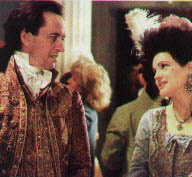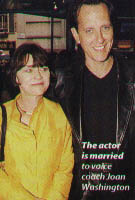The Scarlet Pimpernel – Now Magazine
NOW Magazine – February 4th, 1999
By Mary Fletcher
In a film studio in Prague, a make-up artist removes the star’s jumbo rollers, back combs the chestnut hair and finishes off with a blast of hairspray. The nose is powered and a slick of mascara defines the lashes.
Finally, the wardrobe mistress checks that the high heels and silk tights are immaculate and that the beaded jacket sits properly across the shoulders.
Looking at the reflection in the mirror, Richard E Grant cracks a toothy grin and says: “How do I look?”
The 41 year old actor’s sporting full make up plus enough satin and lace to stock a small lingerie shop for his part as Sir Percy Blakeney in BBC1’s new Sunday night drama “The Scarlet Pimpernel”. Sir Percy is the English fop who snatches aristocrats from the guillotine in revolutionary France. He’s pursued by arch-enemy Chauvelin (Martin Shaw).
“I’m an 18th Century Batman,” says Richard. “One minute I’m an incompetent fool and the next I’m horse-riding, sword-fighting and seducing women.”

Richard’s enthusiasm is his trademark. He’s an unusual star. He doesn’t drink or smoke and, instead of affecting boredom with the glamour of the movie business as many actors do, he seems genuinely amazed to have got this far. It would be easy to assume that such an upbeat person has never known sadness. But 13 years ago, Richard (the E is for Esterhuysen) and his wife Joan Washington lost their baby Tiffany after just one hour of life. Joan, who’s eight years older than Richard, had miscarried before and Tiffany was born at seven and a half months.
“Not a day goes by without me thinking about her,” says Richard. “Having a funeral for a child you’ve heard make a noise is devastating. You might think you don’t know the baby, but of course you do. At the hospital they asked if we wanted a photograph taken of us holding our baby after she died, which at first I thought sounded like the most hideous thing. But I was so grateful they did it and still am. We’ve kept that photo because there are times when you think ‘Did that really happen?'”
Tiffany’s death brought him closer to Joan and they cherish their daughter Olivia, who was born safely three years later. “We still talk about Tiffany and Olivia knows about her. Not in a macabre, candle-burning kind of way.

But we still honour the day she was born and died. When something like that happens, it binds you to the person you’ve shared it with. It puts any kind of upheaval or financial problems completely into perspective because, once you’ve been there, everything else is relative,” he says.
The loss of Tiffany made the birth of Olivia, 10, even more precious. “We’re aware of that and try not to be overprotective or overindulgent, although I don’t think you can have too much love, so we give her lashings of that. She’s really self-confident, something I never felt as a child, and that’s fantastic.”
The importance Richard places on his relationship with his wife and child becomes more apparent as he talks about his background. His parents divorced when he was 11. “marriage break-ups are so common now,” says Richard, who grew up in Swaziland where his dad was the country’s director of education.
“But I didn’t know any other families that weren’t together then. The cruelty of other children was something I’ll never forget.”
When Richard was 24, his father contracted cancer. “He had nine painful months before he died. He was 51, which now seems to me to be very young.”
Six months after his father’s death, Richard arrived in London to pursue acting. “I thought I’d made the biggest mistake of my life,” he says. “Every hour in the first week I considered giving up. But I got a waiter’s job and then I did a lunchtime play and so it went on. Besides, I have this blind, idiot faith and ambition.”

He met Joan, a National Theatre dialogue coach, a year later and they married in 1986. He thanks her and Olivia for keeping him grounded. “They’re the first to tell me if I get any inflated notions about myself. They’re the ones who’ve seen me at 5am when I’m all grump and horrible. But it’s always a relief to go home. Even washing up seems exotic when you’ve been away working. It still amazes me that I’ve not only succeeded in my dream of becoming an actor and met everybody I hoped I might one day meet, but stayed this long. I just hope it carries on. I see myself as a third of the way through my life because I fully intend to live to 120. Now that you can get those sheep’s hearts and tubes from pigs, I intend to have the lot. I want to go on the first passenger ship into space before I slough off this mortal coil, even if I have to be wheelchaired onto the space shuttle. I never want to retire. If I can still get out of bed in the morning and remember my lines, I intend to continue.”




